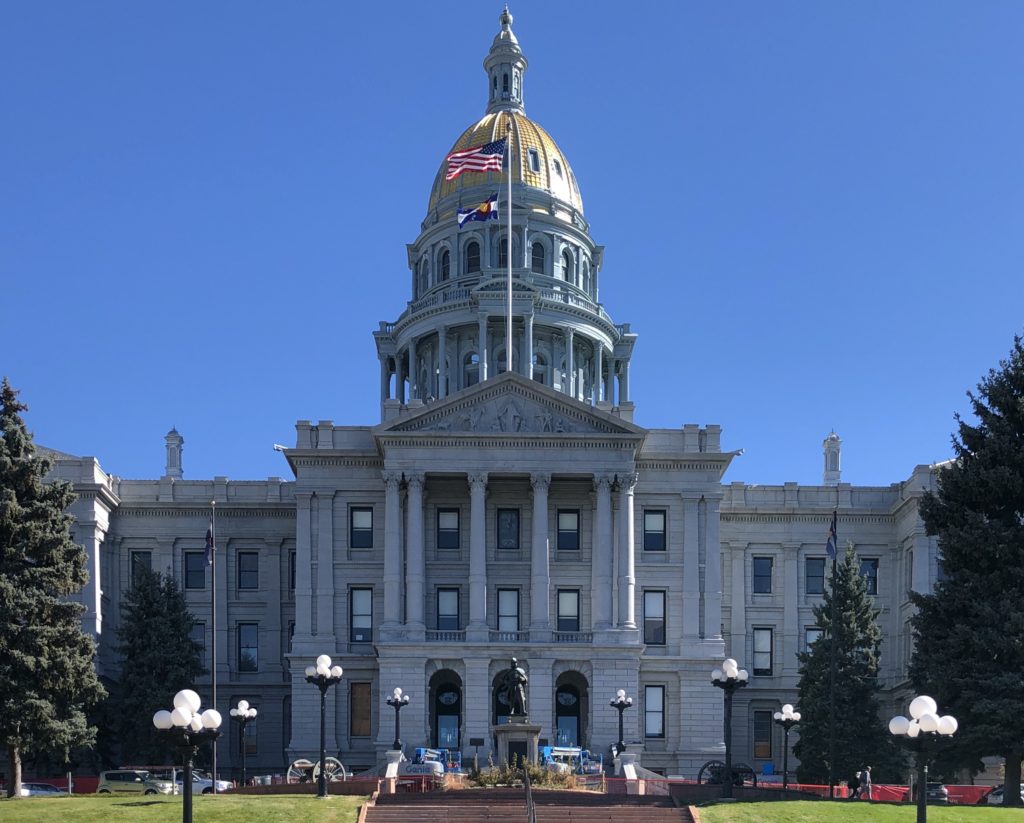By Jeffrey A. Roberts
CFOIC Executive Director
The passage of an historic, comprehensive police reform bill transformed a relatively quiet 2020 Colorado legislative session for freedom-of-information issues into one of major importance.
Senate Bill 20-217, sent to Gov. Jared Polis’ desk on Saturday, includes multiple, ground-breaking provisions for holding law enforcement officers accountable. Among them: Requiring agencies to provide body-worn cameras to all officers who interact with the public and requiring the public disclosure of footage from body cams and dashboard cams. (More details on the body-cam provisions here.)
Polis says he will sign the bill, which also requires the public reporting, in an online searchable database, of extensive information on use of force by law enforcement officers that results in death or serious injuries.
“This is a defining moment in our state,” Sen. Rhonda Fields, D-Aurora, said during floor debate. She later tweeted: “This critical bill is calling for accountability and transparency. It is past time to improve public confidence in the integrity of our law enforcement. The bill mandates body cameras, reins in the use of deadly force used by law enforcement, and holds officers accountable.”
Prior to SB 20-217, introduced after the police killing of George Floyd in Minneapolis, lawmakers took up only a few measures related to government transparency and freedom of information – including one that would have gutted a police transparency law passed last year.
Two transparency bills died immediately after legislators reconvened in May following a 2½-month hiatus prompted by the coronavirus pandemic. With COVID-19 devastating government budgets, lawmakers purged multiple measures, targeting in particular many that carried a price tag.
Among those were House Bill 20-1130, a bipartisan measure that would have required the state’s judicial branch to publish Colorado Supreme Court and Colorado Court of Appeals opinions online in a searchable format and at no cost to the public.
The judiciary currently provides free website access to higher-court rulings going back about 20 years, but a complete collection is available only via subscription-based services such as LexisNexis, Westlaw and Bloomberg. The bill would have created a comprehensive database dating to when Colorado became a state in 1876.

Also defeated after the coronavirus recess: Senate Bill 20-179, which would have had each district attorney’s office collect and report demographic, charging and sentencing data on criminal defendants, and House Bill 20-1357, which would have implemented the recommendations of a K-12 media literacy advisory committee.
Here is a roundup of other transparency and First Amendment-related bills:
Internal affairs. At the request of the bill sponsor, Rep. Dave Williams, R-Colorado Springs, a House committee killed a proposal that would have significantly weakened the 2019 law that opened records on police internal affairs investigations. Williams said he couldn’t get transparency advocates and law enforcement groups to work together on a compromise amendment to the bill, which would have made the internal affairs files of “exonerated” officers off-limits to journalists and the public without a court order.
Police radio encryption. For the third straight year, lawmakers rejected a proposal to address the trend among law enforcement agencies in Colorado to fully encrypt their radio traffic. House Bill 20-1282 differed from unsuccessful measures in 2018 and 2019 by focusing on trying to ensure that at least local news outlets could listen to encrypted transmissions.
It would have required government entities that encrypt all their radio communications to have a policy for granting access to members of the news media, including “reasonable” restrictions on the use of radio monitoring equipment and standards to prevent the entity “from imposing unreasonable and burdensome limitations.” That provision was intended to stop law enforcement departments, as some have done, from allowing access to encrypted communications only if news organizations sign agreements with indemnity clauses and other provisions that could chill the exercise of their First Amendment rights.
Colorado constitutional rights. At the sponsor’s request, a House committee voted down a bill to allow civil lawsuits in state courts against Colorado governmental entities for violations of rights enumerated in the Colorado Constitution, including free speech and free press.
House Bill 20-1287, dubbed the Colorado Rights Act, would have allowed anyone whose Colorado constitutional rights are infringed upon to bring a civil action in state court and receive reasonable attorney fees and court costs upon prevailing.
The declaration of free speech and free press rights in Article II, Section 10, of the Colorado Constitution is stronger than in the First Amendment. Tom Kelley, past president of the Colorado Freedom of Information Coalition and a current board member, testified that a 1982 Colorado Supreme Court ruling relied on the Colorado Constitution to uphold The Denver Post’s victory in a libel suit.
SB 20-217, the police accountability bill, does allow a victim of police misconduct to bring a lawsuit in state court for a violation of rights under the Colorado Constitution.
Electronic school board meetings. Before recessing during the pandemic, the legislature passed – and Polis signed – a bill that redefines a school board meeting quorum to include members who attend electronically. House Bill 20-1301 was introduced before the spread of the new coronavirus to make it easier for rural school board members to attend meetings. Senators added a safety clause to the measure, declaring it “necessary for the immediate preservation of the public peace, health, or safety,” thus allowing it to go into effect upon the governor’s signature.
Nonsubstantive email exchanges. House Bill 20-1308 was another pre-pandemic measure that died after lawmakers returned to the Capitol. The bill was meant to ensure that elected officials could exchange emails unrelated to “the merits or substance” of pending legislation or other public business, without potentially violating the Colorado Open Meetings Law. If elected officials forwarded information, scheduled meetings or responded “reply all” to a constituent’s inquiry sent to the entire body, it wouldn’t have been a “meeting” under the law.
Student free expression. Polis signed House Bill 20-1062, which protects public school employees who work with student journalists from retaliation by school administrators. It also clarifies that student publications protected by freedom of speech and press can be printed, broadcast or online.
For information on other bills tracked by CFOIC during the 2020 session, see the BillTrack50 widget on our website.
Follow the Colorado Freedom of Information Coalition on Twitter @CoFOIC. Like CFOIC’s Facebook page. Do you appreciate the information and resources provided by CFOIC? Please consider making a tax-deductible donation.




